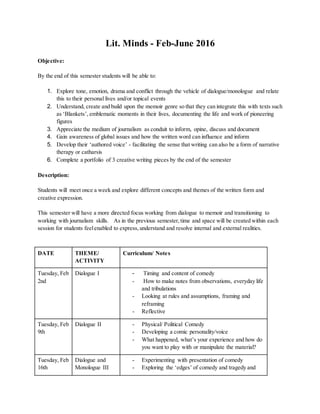
Lit.MindsFeb-June2016
- 1. Lit. Minds - Feb-June 2016 Objective: By the end of this semester students will be able to: 1. Explore tone, emotion, drama and conflict through the vehicle of dialogue/monologue and relate this to their personal lives and/or topical events 2. Understand, create and build upon the memoir genre so that they can integrate this with texts such as ‘Blankets’, emblematic moments in their lives, documenting the life and work of pioneering figures 3. Appreciate the medium of journalism as conduit to inform, opine, discuss and document 4. Gain awareness of global issues and how the written word can influence and inform 5. Develop their ‘authored voice’ - facilitating the sense that writing can also be a form of narrative therapy or catharsis 6. Complete a portfolio of 3 creative writing pieces by the end of the semester Description: Students will meet once a week and explore different concepts and themes of the written form and creative expression. This semester will have a more directed focus working from dialogue to memoir and transitioning to working with journalism skills. As in the previous semester,time and space will be created within each session for students feelenabled to express,understand and resolve internal and external realities. DATE THEME/ ACTIVITY Curriculum/ Notes Tuesday, Feb 2nd Dialogue I - Timing and content of comedy - How to make notes from observations, everyday life and tribulations - Looking at rules and assumptions, framing and reframing - Reflective Tuesday, Feb 9th Dialogue II - Physical/ Political Comedy - Developing a comic personality/voice - What happened, what’s your experience and how do you want to play with or manipulate the material? Tuesday, Feb 16th Dialogue and Monologue III - Experimenting with presentation of comedy - Exploring the ‘edges’ of comedy and tragedy and
- 2. where they might intersect Ultimate objective: 5 min stand-up routine (solo or in pairs) Tuesday, Feb 23rd Memoirs I ‘What will I be?’ Students to explore different types of memoirs: - Participants will explore who they might become by discussing their past experiences as a child or young adult. - Use personal writing to develop self-awareness - Incorporate own experiences in writing attempts - Use examples from graphic novel Blankets Tuesday, March 1st Memoirs II Sibling Rivalry: - Participants will use the Boondocks and Blankets comicstrip as an example to explore themes of sibling and family dynamics: (1) having older brothers or sisters (2) having younger brothers or sisters (3) being the only child (4) being the oldest (5) being the youngest - Participants to share memories triggered by the Boondocks in bigger group - Participants could then write about their ‘secret’ feelings concerning family members Tuesday, April 5 Memoirs III Parents: - Participants will use Blankets and Fun House to explore themes - Think-pair-share: How can you show someone (best friend, parent, relative, etc.) that you care about them? Students will be encouraged to write their thoughts, then share their ideas with a partner. This will be followed by a whole class discussion Tuesday, April 12 Memoirs IV - A Treasured Object: - Create or further strengthen personal narrative - Participants will bring in a photo or object related to their memoirs to then w Tuesday, April 19th Memoirs V Emblematic Moments: - Speak and write from personal experience - Students will record their memoirs discussing a
- 3. moment in their lives in which they overcame and challenge. Students can choose the creative writing they want to do it in, i.e. could be via a poem or lyrics Tuesday, May 3rd Journalism I News Leads: - The 5 W’s and H - Qualities of a good news story - Active verbs - Write and revise good leads, role play use of news elements to plan front page of newspaper. Worksheet: improve poor leads based on tips for good leads Tuesday, May 10th Journalism II The structure of a news story: - The inverted pyramid and structure of a straight news story - Compare lead writing to other types of writing Students select own topics or work from pre-prepared outlines to work to deadlines Tuesday, May 17th Journalism III Descriptive writing: - Explore the 5 senses as springboard to good descriptive writing - Differentiating between literal and figurative language Worksheet: creating figures of speech and literal sentences Tuesday, May 24th Journalism IV Interview skills: - Demonstrate good interview skills and etiquette - Role play interviews in group - Talk show clip Crib for interviews developed Tuesday, May 31st Journalism V Guest speaker from Governor Cuomo’s office Tuesday, June 7 Movie and Review Introduction to movie critiquing skills: - Watch series of short films (fiction and non fiction) - Evaluate in terms of content, editing, production, narrative content Discussion group to elicit above skills.
- 4. Wednesday, June 8 End of Year Party End of year BIG party in room 206 Thursday, June 9 Journalism VI Trip to New York Times/Celebration Dinner Afterwards(end of the year celebration)